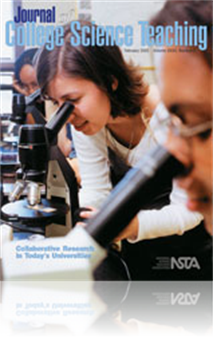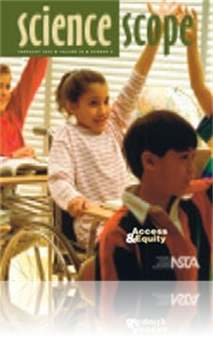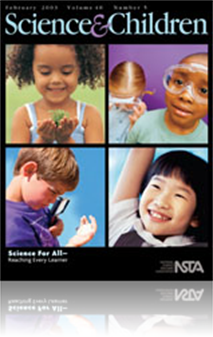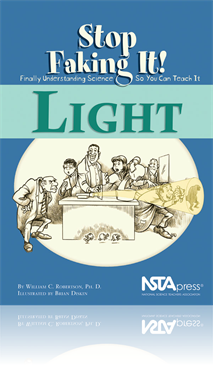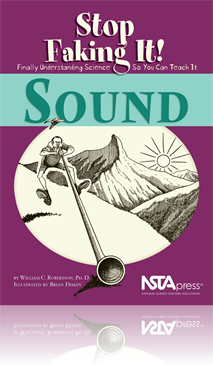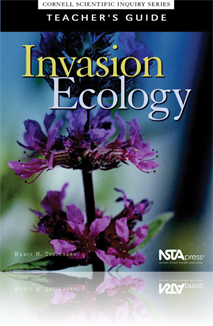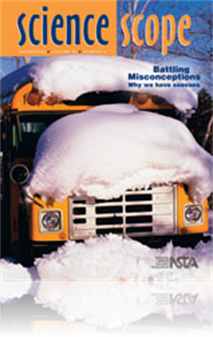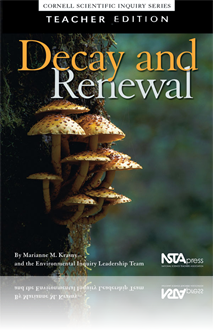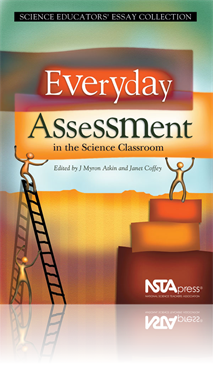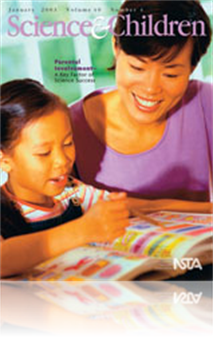All Resources
Journal Article
Concept mapping in the organic chemistry laboratory can supplant cookbook activities with higher cognitive exercises. The common thread of most organic lab experiments is the synthesis, isolation, purification, and characterization of a carbon compou...
Journal Article
Making Science Accessible: Strategies to Meet the Needs of a Diverse Student Population
Despite the sincere interest of many teachers to address the varying educational needs of their students (Scruggs and Mastropieri 1994), the current emphasis on inclusion remains a source of frustration, misunderstanding, and distrust by some teacher...
Journal Article
The importance of environmental influences outside of school has been the focus of numerous studies that support the home’s influence on science learning. Students who come from homes primed with experiences that parallel curriculum are able to imm...
Journal Article
Issues in Science and Technology
In this course, students select a current issue in science and technology and then explore it in a scientific manner. They work in groups and individually to examine the history behind the science and technology that have led to the issue and conside...
Journal Article
A teacher describes how developing a structured, focused, and fun curriculum on rocks and minerals for learning-disabled students transformed her initial reluctance about Earth science into enthusiasm. Students observed, described, and sorted rocks a...
Journal Article
Field Trip Preparation: Increasing student knowledge about matter and energy before a field trip
When student interest is waning toward the end of the school year a class field trip will catch their attention. In this article, activities and discussion about matter and energy prepare students for a more rewarding field trip....
Journal Article
Investigations in the Science of Sports
The Sisters in Sport Science (SISS) program addresses the need for girls to gain equitable access to science and mathematics education by using sport as a vehicle for learning. Through sport, not only are girls learning the underlying principles of s...
Journal Article
Success with Investigations: Strategies for facilitating student science investigations
Classroom strategies for the teacher help strengthen student investigative skills and processes. In this article, the author discusses common weaknesses associated with students’ performance on science investigations, and how classroom strategies c...
Journal Article
Often, a bright planet that is visible over the horizon will be mistaken for a star. Some believe they can tell the difference between a star and a planet because stars twinkle, or scintillate, and planets do not. In actuality however, both will twin...
Journal Article
Science Sampler: Achieving Gender Equity in Middle School Science Classrooms
“I hate science. It’s so boring. What’s the point anyway?” Many middle school students feel this way, including the author and her best friend at the outset of seventh grade. However, their views of science soon changed when “Mrs. P” taug...
Book Chapter
This book starts with a rather simplistic view of what light is. This chapter starts with a simple explanation which will be easy to understand and it will explain quite a few things. Also, historically, it's the one that came first; hence the title...
Book Chapter
You're probably really upset that all you have so far is a simple little ray model of light. When do we get to the good stuff, you say? How about now? As a bonus, you get to look at lots of pretty colors. This chapter addresses how light can be model...
Book Chapter
It's time to take some of the things we know about light and put them to good use. In this chapter, the author discusses various optical instruments like antennae and lenses, and in the Applications section, you get to learn how telescopes work. That...
Book Chapter
If you browse through the sunglasses at your local department store, you'll find that some of them are advertised as "polarized." What is it that makes a pair of polarized sunglasses so special, and are they really better at reducing glare, as advert...
Book Chapter
Light doesn't always travel in straight lines. It can bend around corners, just like sound. When it does change direction like this, you end up with light waves that originated from different places coming together at one spot. This can lead to some ...
Book Chapter
This chapter is, as the title indicates, all about eyeballs and how they work. We'll use just about everything we've learned so far, plus one or two new things, including how to draw 3-D pictures. You'll be asked to do a number of little projects, on...
Book Chapter
Fire the Photon Torpedoes, Mr. Sulu!
Yeah, what about those photon torpedoes? Aren't photons supposed to be little light particles? Yes, they are, and they constitute the third model for what light is. Although much of the photon stuff is beyond the scope of this book, the author gives ...
Book Chapter
Stop Children, What's That Sound?
Aging hippies might recognize the title of this chapter from an old Buffalo Springfield song. Others will just have to ignore it, and realize that this is the first chapter in a book on sound. As you go through this book, you'll be exposed to scient...
Book Chapter
Unless you really haven't been paying attention to the world around you, you know that plucked strings produce sounds. Carlos Santana demonstrates this on a regular basis. Because stringed instruments are so commonly used to produce sounds, we're g...
Book Chapter
Sound travels in waves, but those waves aren't exactly like waves on a string. One nice things is that sound waves have all the same relationships between frequency, wavelength, and velocity that waves on a string have. In this chapter, we will fin...
Book Chapter
Harmonic convergence refers to a day back in 1987 where there was a particular planetary alignment. New Agers went crazy over the event, and if you want to get a taste of what it was like, enter harmonic convergence into your favorite Internet searc...
Book Chapter
Yep, you guessed it. This chapter is all about music. Yes, we've already talked about music and musical instruments, but we're going to get into this subject in more detail. For example, you might already know that larger musical intruments tend t...
Book Chapter
We've covered most of the basics of how sound is produced and transmitted, but we've left something out, and that's all the electronic devices we use to amplify sound, reproduce it, or get it from one place to another. How exactly does a CD player w...
eBook
Light: Stop Faking It! Finally Understanding Science So You Can Teach It (e-Book)
Why is left right and right left in the mirror? Baffled by the basics of reflection and refraction? Wondering just how the eye works? If you have trouble teaching concepts about light that you don’t fully grasp yourself, get help from a book that�...
eBook
Sound: Stop Faking It! Finally Understanding Science So You Can Teach it (e-Book)
Muddled about what makes music? Stuck on the study of harmonics? Dumbfounded by how sound gets around? Now you no longer have to struggle to teach concepts you really don’t grasp yourself. Sound takes an intentionally light touch to help out all...
eBook
Invasion Ecology (Teacher’s Guide—Includes Full Student Edition) (e-book)
Strange intruders are invading our part of the world, threatening our environment and our economy. These newcomers and their impact on our ecological balance are the focus of Invasion Ecology, a new book that teaches students to investigate the beha...
NSTA Press Book
Sound: Stop Faking It! Finally Understanding Science So You Can Teach It
Muddled about what makes music? Stuck on the study of harmonics? Dumbfounded by how sound gets around? Now you no longer have to struggle to teach concepts you really don’t grasp yourself. Sound takes an intentionally light touch to help out all...
By William C. Robertson, Ph.D.
NSTA Press Book
Light: Stop Faking It! Finally Understanding Science So You Can Teach It
Why is left right and right left in the mirror? Baffled by the basics of reflection and refraction? Wondering just how the eye works? If you have trouble teaching concepts about light that you don’t fully grasp yourself, get help from a book that�...
By William C. Robertson, Ph.D.
Journal Article
How to Plan, Survive, and Even Enjoy an Overnight Field Trip with 200 Students
Although taking an overnight trip with 200 middle schoolers might seem like an impossible task, this author does it regularly. Using the example of a three-day trip she took to Yellowstone National Park with her students, the author shares tips and s...
Journal Article
Scope on Safety: Have a safe trip!
Science safety isn’t just a set of rules. It requires common sense and that teacher intuition that helps us predict what might happen when we least expect it. To that end, this month’s column offers some practical advice to help you prepare for s...
eBook
Decay and Renewal (Teacher Edition—Includes Full Student Edition) (e-book)
Are you looking for a new way to teach about respiration, nutrient cycling, energy flow, producers, consumers, and decomposers? Decay and Renewal provides techniques for students to learn the basics while investigating the science behind biodegra...
eBook
Everyday Assessment in the Science Classroom (e-book)
Make ongoing, classroom-based assessment second nature to your students and you. Everyday Assessment in the Science Classroom is a thought-provoking collection of 10 essays on the theories behind the latest assessment techniques. The authors offer in...
Journal Article
Looking for a way to excite teachers and families about your school’s science program? A “Super Science Saturday” can provide a safe, fun, and interactive educational experience to do just that. When a community collaborates to plan and impleme...
Journal Article
The Science Buddies program pairs a seventh-grade life science class with a second-or third-grade class in a yearlong partnership of science adventures. Over the course of the year these dual-grade learning groups work together on various science exp...
Journal Article
Editor's Note: Happy New Year to All! (January 2003)
In this issue we are highlighting science activities that go beyond the classroom and involve parents and folks in the community with elementary school boys and girls. Most parents, grandparents, neighbors, and professionals are eager to be involved ...
Journal Article
Field Trips Online: Investigating water quality through the Internet
Alternatives to the traditional field trip exist. Teachers can supplement occasional field trips with Internet-based inquiry lessons to explore water quality. ...
Journal Article
Are you challenged to involve parents in your school’s science curriculum? Ridgecrest Elementary School in Hyattsville, Maryland, tackled that issue and found a successful solution in an exciting program called “Playtime Is Science” (Sprung, Fr...
Journal Article
Most editions of supermarket tabloids include "science-related" stories that make science teachers cringe. Find out how they present learning opportunities by helping students to discriminate between factual and bogus stories. ...



